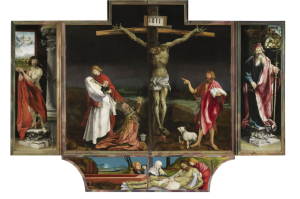Prepare
Since Luke 9:51, Jesus has had his face set toward Jerusalem, meaning he is moving intentionally toward the events of the cross and resurrection. Now, in Luke 23:33-43, Jesus has, in the understated language of Luke, been “crucified” between two criminals. Below him, soldiers callously cast lots for his clothing. Religious leaders jeer and mock him. The Roman Empire taunts him and his fellow Jews by nailing a sign above his head: This is the King of the Jews.
In the words of the prophet Isaiah: He was despised and rejected by others; a man of suffering and acquainted with infirmity; and as one from whom others hide their faces, he was despised, and we held him of no account. (Isaiah 53:3; NRSV)
But as Jesus hangs on that cross, innocent—as one of the criminals recognizes—Jesus’s thoughts are not on himself. He doesn’t cry out in anger. He doesn’t curse his enemies or call down the wrath of God on them or even hold them accountable—even though he has been unjustly nailed to that cross.
True to his teachings about loving enemies and forgiving others, Jesus’s first words from the cross are words of reckless grace: “Father, forgive them; for they do not know what they are doing.” (Luke 23:34; NRSV).
Opening Exercise
In groups of two, define forgiveness using FORGIVE as an acrostic. Bonus points if your acrostic is a 7-word sentence defining forgiveness.
Text
Read: Luke 23:33-43
Scandalous Forgiveness
In 2004, Mel Gibson released his film version of the crucifixion of Jesus: The Passion of the Christ. The film covers the 12 hours from Jesus praying in the
Garden of Gethsemane to his final breath on the cross, with stops before Caiaphas and Pontius Pilate along the way. The film was masterfully shot, but, unlike the massively understated description of the crucifixion by the Gospel writers (i.e., “they crucified him”), Gibson’s film goes into gory detail. The violence depicted in the film earned the movie an R rating.
Many Christians, though repelled by the graphic violence depicted of the cross, experienced a deeper understanding of what exactly Jesus went through for us. One pastor friend said that for her it was one of the most moving depictions of God’s love she’d ever experienced. Others condemned the film as violence porn. I tend to side here. But perhaps such criticism tends to miss Gibson’s point. The violence of the cross is lost to us centuries later. The original writers didn’t need to go into the details. Their readers had seen crucifixions. Maybe an argument can be made that we should at least have some understanding of the horror of the most defining moment in human history?
But whether or not we should go into the gruesome details of crucifixion, the story of this particular cross is not primarily about the violence. The main story is about the victim of this violence, and his response to it.
Others had been crucified like Jesus. Others have experienced horrific deaths for their causes. What makes this cross different is the one hanging on it: God, the Creator of the Universe; who created humans in God’s Image; who became human in the person of Jesus (the Word became flesh, John 1:14); is nailed to that cross by those created in God’s Image. Consider what the Lutheran theologian Gerhard Forde said:
“Why could not God just up and forgive? Let’s start there. If we look at the narrative about Jesus, the actual events themselves, the “brute facts” as they have come down to us, the answer is quite simple. He did! Jesus came preaching repentance and forgiveness, declaring the bounty and mercy of his “Father.” The problem, however, is that we could not buy that. And so we killed him. And just so we are caught in the act. Every mouth is stopped once and for all. All the pious talk about yearning and desire for reconciliation and forgiveness, etc., all our complaint against God is simply shut up. He came to forgive and we killed him for it; we would not have it. It is as simple as that.”
How does Jesus respond? Not by condemning us or judging us or calling down the wrath of God on us. Instead, Jesus says: Father, forgive them, because they don’t know what they are doing! Father, don’t hold this against them. Let it go. Release them from their actions. They think they know what they are up to, but they’re clueless. They’re lost. Set them free.
God, in Jesus, meets violence with grace; anger with forgiveness; abuse of power with reconciliation. Always. And only. God, in the person of Jesus, meets you with that same reckless grace; that same audacious love; that same scandalous forgiveness.
You are the one Jesus forgives. You are the one Jesus loves. You are the passion of the Christ.
Reflection Questions:
- What do you think Forde means when he says, “He (Jesus) came to forgive and we killed him for it. We would not have it. It’s as simple as that.”?
- Do you agree or disagree with him and why?
- How would you describe God’s forgiveness? What does it smell like, taste like, and sound like?
- Why might God’s grace be characterized as reckless?
- What makes God’s forgiveness scandalous?
Closing Activity
- Celebrate the Eucharist together, if possible. Hone in on the words—The blood of Christ—shed for you!
Or
- Take turns making the sign of the cross on each other’s forehead and say to them: In the mercy of Almighty God, Jesus Christ was given to die for you, and for his sake, God forgives you all your sins.
Final blessing (Pray Together)
Now may the LORD bless us and keep us. May the LORD’s face shine on us and be gracious to us. And may God’s face always be turned toward us and fill us with grace.
Amen.
Bio
Tim Wright recently retired after 41 years of ordained ministry in the ELCA. He and his wife, Jan, have been married since 1979. They have two adult children, five grandchildren, and two dachshunds. They live in Glendale, AZ.
You can access Tim’s Reckless Grace Substack at https://recklessgrace.substack.com/ and his Deep-Grace Diving Podcast at https://open.spotify.com/show/4WPRRpqMtUzyPeqcqbqrgv
He is also the author of the middle school series: The Adventures of Toby Baxter. https://www.timwrightbooks.com/


